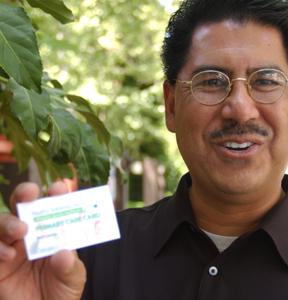![[Metroactive News&Issues]](/gifs/news468.gif)
[ Silicon Valley | Metroactive Home | Archives ]

Medical Miracle: Paul Garcia saved money using this medical discount card. Others haven't been as fortunate. A House Call The Assembly wants to crack down on services pushing low-cost doctor visits By William Dean Hinton PAUL GARCIA dropped his insurance a decade ago after his carrier began increasing premiums because one of his daughters was born with a minor heart ailment. The insurance lapse wasn't significant until last fall, when Garcia developed discomfort in his right Achilles tendon. A Los Gatos doctor told him it looked like the 46-year-old self-employed printer had torn the tendon, but tests would have to be run. The cost: $1,700. Garcia balked at the price and decided to find a cheaper way. He wound up at Healthy Solutions Inc., a San Jose medical-discount service opened last year. Healthy Solutions charged Garcia $250 to buy a card allowing his family to visit one of its 10 primary-care doctors for $35 per visit. Garcia used the card, he says, at the same Los Gatos doctor who was prepared to charge him $1,700. With the medical-discount card, he paid only $500. "I saved a ton of money," Garcia says. "Not even when I go to Vegas do I do that well." Gambling is an apt reference because critics of medical discount services say they are a risky proposition. Lloyd Levine, a Van Nuys Democrat and the House majority whip, has authored a bill making sale of the cards illegal, saying they are designed to prey on ill-informed indigents. "They're a scam," says Levine spokesman Stuart Waldman. Companies like Healthy Solutions don't pay doctors to be part of their service. Rather, doctors use the service to tap into the 2 million Bay Area residents who don't have health insurance. They also save time and effort by avoiding the insurance bureaucracy. Healthy Solutions President Ray Rodriguez says he signs contracts with his network of doctors, which includes five specialists (even a surgeon), two dentists and two chiropractors in addition to the 10 primary-care physicians, for lost-cost visits. "I can deliver health care without a penny spent by government," he says. Rodriguez is a long-time valley resident who co-founded the San Jose Downtown Association. He is a freelance photographer who has done portraits for such politicians as former mayor Tom McEnery and former Congressman Ed Zschau and contributed to local newspapers, including Metro. Rodriguez says there are three factors that have given rise to medical-discount businesses. Insurance has increased 60 percent in the last four years. Businesses don't want to pay for the high cost of health care. And governments are being forced to curtail subsidies because of dwindling resources. To combat Levine's bill, Rodriguez plans to contact the assemblyman and take his case to business groups. "They think we are ripping off some poor person who is too dumb to know the difference," he says. "What Levine has is misinformation. He is a passionate person who wants to do what is right for the working person. Well, we are just as passionate." Rodriguez's company does not force customers to provide automatic checking withdrawal to purchase discount cards. Other companies do, which has led to a federal lawsuit that could have major implications throughout California. Manuela and Juan Zermeno of Northridge signed with Texas-based Care Entrée for low-cost primary care in 2001. Care Entrée withdrew $55 monthly from the Zermeno checking account for reduced medical, dental and vision and a 40 percent discount on prescriptions. Manuela Zermeno soon learned that one of the dentists she contacted on the Care Entrée list had never heard of the company. She went to another dentist, who also had not heard of Care Entrée. The couple tried to cancel the service in December 2001. According to court documents, Care Entrée continued to withdraw money from the Zermenos' account for a year afterward, even though the Zermenos never received a medical discount card. The company still hasn't provided a refund. "There's a proliferation of these kinds of businesses in Los Angeles County," says Zermeno attorney Sonal Ambegaokar. Most of them operate in a similar manner, targeting low-income Hispanics through magazines and radio. "They're a really big problem in California," Ambegaokar says. "They sell themselves as the answer to the problem but they're not health insurance. Many people miss the fine print and think they have insurance. They don't understand why they still have to pay for an office visit." Ambegaokar says there's already a safety net for people too poor to pay for medical care. Santa Clara County has a hospital, eight clinics, about a dozen nonprofit clinics and about 40 health programs for communicable diseases like HIV and tuberculosis. The cost depends on how much a patient's family earns. "Some people don't know they're eligible when they clearly are," Ambegaokar says. "Other people think that if they sign up, it will affect their immigration status." Ambegaokar says low-income patients can also ask their doctors to decrease their fee for an office visit. That's what Paul Garcia has done with his dentist, a family friend. Says Garcia, "He gives me a break."
Send a letter to the editor about this story to letters@metronews.com. [ Silicon Valley | Metroactive Home | Archives ]
|
From the April 28-May 4, 2004 issue of Metro, Silicon Valley's Weekly Newspaper.
Copyright © Metro Publishing Inc. Metroactive is affiliated with the Boulevards Network.
For more information about the San Jose/Silicon Valley area, visit sanjose.com.